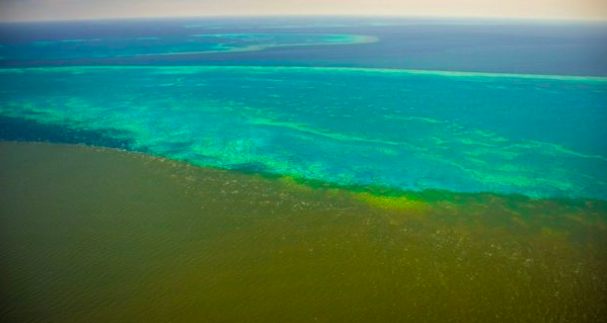
Runoff from flooding hits Great Barrier Reef Photo: Matt Curnock, Tropwater JCU
The Australian government has given the go-ahead, according to The Guardian, for the Port Authority of North Queensland to dump more than 1 million tons of dredge spoil near the reef, taking advantage of an unfortunate loophole in the laws that were supposed to protect the Great Barrier Reef Marine Park. The Great Barrier Reef, long considered a world wonder, has suffered a series of crises in recent years, including pollution, rising ocean temperatures, and a massive coral bleaching event. Smithsonian Magazine explained:
- Australia’s federal government in 2015 banned the dumping of sludge within the Great Barrier Reef Park’s boundaries.
- But the ban only applied to new projects and but did not include dredged up sludge from maintenance projects, like removing sediment from shipping lanes, at the ports.
- This dumping would come after a major flood in Queensland recently washed a massive plume of pesticide-tainted sediment onto the reef, which could smother the delicate corals or lead to an algae bloom, according to the Australian Broadcasting Corporation.
Scientists claim that the extent of the damage that this sludge could cause depends on when and where the sludge, which is likely contaminated with heavy metals from the industrial port, is placed. If the sludge is deposited far enough offshore and far from the reef, the impact could be minimized, but if it is dumped close to the Park the impacts could be devastating. Ironically, about a year ago, the BBC reported that the government of Australia pledged about $350 million (USD) to protect the Great Barrier Reef, which has lost 30% of its coral due to a devastating bleaching event. One of the threats the government said it needed to fight with this funding was “large amounts of sediment.”
Why This Matters: The Great Barrier Reef is in trouble — as severe bleaching events continue to hammer it. It is also a key driver of the Australian economy, worth $6.4 billion annually according to a recent economic analysis. It is one of the natural wonders of the world. Why would the Park Authority and the Government allow this dumping? It is hard to understand and a tragedy. The last thing this area needs is a million tons of toxic sludge. Sad.
February 26, 2019 » Australia, bleaching, coral, dredge, Great Barrier Reef, sludge, spoil, toxic


